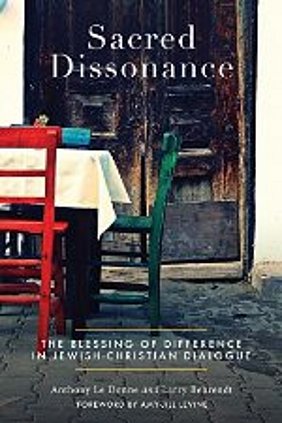Anthony Le Donne, a Protestant professor of New Testament at United Theo-logical Seminary in Dayton, Ohio, and Larry Behrendt, a Jewish (and Jewishly-knowledgeable) software engineer and attorney, chose to engage in an honest and sustained interfaith dialogue with each other. Following this, they chose to share their interfaith exchanges by co-writing a book about their experiences as dialogue partners.
The book covers four topics: how personal backgrounds shape our identity; how the desirability of reinforcing or lowering community borders plays a role in determining our level of interaction with those outside of our religious tradition; the impact of the Holocaust on Jewish-Christian dialogue; and how the attitude we bring to our relationships with others, which they call “posture,” can influence how well or how poorly the dialogue may proceed. The book begins with two es-says, in which each presents his own thoughts on the topic without sharing them with the other. This is followed by a transcript of their actual dialogue, which includes discussion of their reactions to the other’s essay. This structure makes the book easy to follow, and the writing style is quite engaging.
While some people involved in interfaith dialogue prefer to focus on the commonalities and similarities between Judaism and Christianity, Le Donne and Behrendt believe that it is just as important to face their religious differences and to learn not just how to understand what separates them, but to be able to appreci-ate the differences. Unlike other books on Jewish-Christian dialogue, their work does not discuss the mechanics of dialogue (i.e., models one might use) or theo-ries of dialogue. Instead, it gives the reader an intimate glimpse into how two individuals with differing religious identities can succeed in listening to each oth-er with respect, even when not agreeing with each other.
Larry Behrendt makes an important point that Jewish-Christian dialogue has an inherent “asymmetry,” since Jews are such a small minority compared to the over two billion Christians in the world (p. xxxvi). In addition, as a member of a minority that faced near-extinction in the Holocaust, he expresses some of the fears that Jews face. These include the threat to Jewish survival posed by Chris-tian efforts to convert Jews; the fear that the Christian misinterpretation of the New Testament that led to the deicide charge and contempt for Jews may still exist in Christianity today; and the ultimate fear that the Christian anti-Judaism that existed for centuries in the past could lead to another Holocaust. Behrendt makes a striking remark that Jews wish for nothing more than “to be left alone” (p. 240), but that the trauma of the Holocaust forces Jews into dialogue, if only for damage control and self-preservation.
Anthony Le Donne takes a very different stance. As a Christian, he focuses primarily on the many criticisms he has of his fellow Christians. He is quite open about what he sees as the problems that still remain within Christian thinking and that prevent better relations with and views of Jews. He states repeatedly that many Christians who genuinely like Jews may still have anti-Jewish views; that most Christians have never met a Jew and know virtually nothing about them; that Christians are completely unaware of how threatened Jews feel; that Christians are abysmally ignorant about the Holocaust and know nothing of the role Christianity played in the Holocaust; that the Christian ideal of eliminating all borders and having universal peace through Christ does not allow for alternative forms of salvation; and that most Christians know nothing about Martin Luther’s anti-Jewish teachings (Le Donne only learned about them in college).
The two partners do speak about wanting to move beyond the common perception in Jewish-Christian dialogue that Jews are (were) victims and Christians are (were) perpetrators, but their discussions do tend to reveal that these perceptions are present even in their dialogue. Behrendt admits that he often takes a defensive posture in the discussion because he does not want to see Jews be in a “defeated” position once again. Le Donne responds by saying that the ideal outcome should be a “win-win” for everyone, but that this requires Christians to give up the long-held notion of triumphalism (p. 209).
Anthony Le Donne also challenges Behrendt about Behrendt’s strong stance as an advocate for the LGBT community, which can be a dialogue-stopper for those who are more conservative in their religious outlook. Behrendt counters by pointing out to Le Donne that Le Donne’s equally strong support for pacifism can also end the dialogue with those who feel that sometimes military action is the only way to prevent genocide.
It is quite impressive that these two friends share so much of their deeply personal feelings and beliefs, and that they remain close friends in spite of their many differences. Nevertheless, what is revealed in their book is the reality that Jews and Christians have not yet come to terms with the Holocaust and centuries of Christian anti-Jewish teaching and contempt. Behrendt and Le Donne both insist that Jews and Christians need to remember these tragedies together, not separately.
The title of the book captures the essence of this intimate portrait, for both see their encounters with each other as sacred, even when the subject becomes uncomfortable or unresolvable. Even dissonance can be sacred, if the intention of the dialogue partners is to create a greater sense of understanding.



